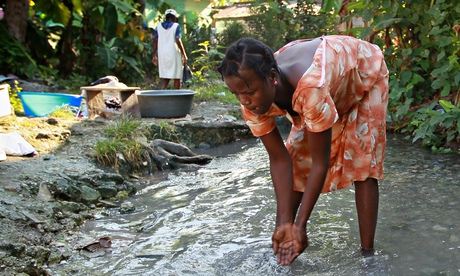- theguardian.com, Friday 7 March 2014 06.06 EST

Haiti needs a “Marshall plan” for water and sanitation to quell a cholera epidemic which poses a major threat to the Caribbean and Latin America, according to the UN assistant secretary general.
Pedro Medrano Rojas, who is co-ordinating the response in Haiti, is visiting European capitals this week to drum up support for the faltering effort to deal with an epidemic that has killed 8,540 since 2010 and infected almost 700,000 people.
Studies have shown the cholera strain was probably introduced to the country by UN troops from Nepal, who were deployed in Haiti after the January 2010 earthquake that killed more than 217,000 people.
Evidence suggests the outbreak of cholera, which is endemic in Nepal, occurred when contaminated sewage was discharged from barracks into a watercourse. Cholera is spread through infected faeces. Once it enters the water supply, it is difficult to contain, especially in a country such as Haiti, which has almost no effective sewage disposal systems.
Cholera cases had previously been rare in Haiti. Survivors of the 2010 outbreak are filing a compensation claim against the UN in a New York court, demanding that billions of dollars in damages be paid to them and the relatives of those killed. The UN maintains it has legal immunity from such compensation claims and rejected demands from affected Haitians. The case is being pursued by the Boston-based Institute for Justice and Democracy in Haiti.
Medrano drew a distinction between the lawsuit and UN efforts to respond to the outbreak. “We cannot link these two things,” he said. “One is a legal case with a different path that can take years … we have to respond now.”
The first case in the current cholera epidemic was reported in October 2010; the outbreak has since become one of the worst in modern history. There were 65,000 cases last year, Medrano said. This year estimates range from 40,000 to 80,000.
“It all depends on the resources we get,” he said. “If we get them, it could be 40,000; if not, it could be 80,000 – maybe more – new cases. It is a major threat for the whole Caribbean and Latin America region.”
The 2010 earthquake wrought havoc in the already fragile country. Even before the disaster, basic sanitation coverage had decreased from 26% in 1990 to just 17% in 2008, with rural residents worst affected. Medrano said the main reason donors were not contributing more was because they did not consider the situation in Haiti to be an emergency.
As part of its anti-cholera effort, the Haitian government has set up a high-level committee chaired by the prime minister. It brings together key ministries – finance, health and public works – as well as donors and NGOs including the UN agency for children, the World Health Organisation and Médecins Sans Frontières.
Haiti has introduced a $2.2bn (£1.3bn) 10-year plan for the long-term eradication of cholera though the large-scale development of public health and sanitation services. The UN is appealing for $69m for the next two years as part of this effort. This year, it is asking for $40m, but so far the only funding committed is $6m from the UN central emergency response fund.
“This is vastly insufficient to meet urgent needs,” the UN said. “The lack of available funds today risks the departure of cholera actors, which could compromise gains attained so far and lead to resurgence in suspected cases.”
Medrano said the current dry season provided an opportunity for a sustained effort, including the vaccination of 500,000 people. Other measures include the supply of water pumps, mobile latrines, mobile health services, water purification tablets and the training of community workers to raise awareness of basic sanitation such as washing hands. But he warned that donors must act now to stem the epidemic.
“Last year was the lowest number of cases, which is a tribute to the Haitian government, but we are operating in an environment with less resources and a third fewer actors,” he said. “People wrongly feel it’s over, but this will take five to 10 years to stop. We have to respond now.”